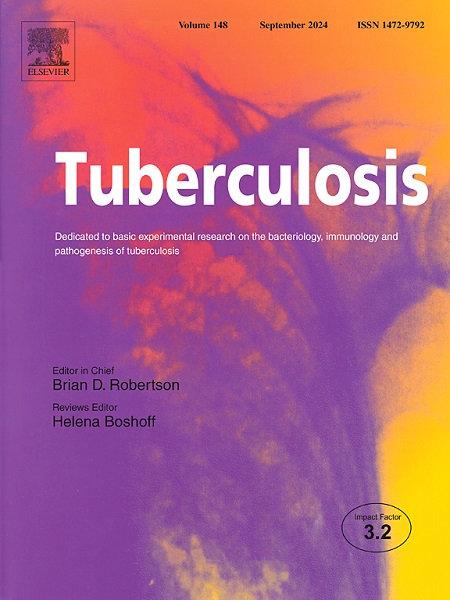The immunomodulatory effects of Mesenchymal stem cells on THP-1-derived macrophages against Mycobacterium tuberculosis H37Ra infection
IF 2.9
3区 医学
Q3 IMMUNOLOGY
引用次数: 0
Abstract
Background
Immune imbalance is crucial in tuberculosis pathogenesis and may be modulated by mesenchymal stem cells (MSCs). However, how MSCs regulate the host's response to Mycobacterium tuberculosis (Mtb) is unclear.
Methods
Human umbilical cord-derived MSCs were co-cultured with Mtb-infected THP-1 macrophages. The intracellular release of ROS in macrophages was measured by DCFH-DA. Cytokine expression was measured by RT-qPCR, apoptosis by Annexin V/PI assay, and pyroptosis markers by Western blotting. Differentially expressed genes (DEGs) in Mtb-infected THP-1 co-cultured with or without MSCs were identified by RNA-seq and potential signaling pathways were analyzed through bioinformatics.
Results
The fibroblastic morphology of MSCs exhibited 95 % positivity for CD73, CD90, and CD105, while the positivity rate for negative marker HLA-DR was less than 2 %. In Mtb-infected THP-1 macrophages, co-culturing with MSCs increased ROS release, cytokines expression (IL-1β, IL-6, TNF-α), apoptosis, and pyroptosis markers (NLRP3, Caspase-1, and GSDMD). Comparative transcriptome analysis identified 347 up-regulated and 291 down-regulated DEGs, primarily associated with receptor-ligand interactions and enriched in cytokine signaling pathways including JAK-STAT, TNF, ferroptosis, and autophagy.
Conclusion
MSCs could enhance the macrophages’ immune response to Mtb by activating immune receptors and inflammatory signaling pathways.
间充质干细胞对thp -1来源巨噬细胞抗结核分枝杆菌H37Ra感染的免疫调节作用。
背景:免疫失衡是结核病发病的关键,可能由间充质干细胞(MSCs)调节。然而,MSCs如何调节宿主对结核分枝杆菌(Mtb)的反应尚不清楚。方法:将人脐带源性MSCs与mtb感染的THP-1巨噬细胞共培养。DCFH-DA法检测巨噬细胞内ROS的释放。RT-qPCR检测细胞因子表达,Annexin V/PI检测细胞凋亡,Western blotting检测焦亡标志物。通过RNA-seq鉴定mtb感染的THP-1与MSCs共培养或不培养的差异表达基因(DEGs),并通过生物信息学分析潜在的信号通路。结果:MSCs成纤维细胞形态CD73、CD90和CD105的阳性率为95%,阴性标志物HLA-DR的阳性率低于2%。在mtb感染的THP-1巨噬细胞中,与MSCs共培养可增加ROS释放、细胞因子表达(IL-1β、IL-6、TNF-α)、细胞凋亡和焦亡标志物(NLRP3、Caspase-1和GSDMD)。比较转录组分析鉴定出347个上调的deg和291个下调的deg,主要与受体-配体相互作用有关,并在细胞因子信号通路中富集,包括JAK-STAT、TNF、铁凋亡和自噬。结论:MSCs可通过激活免疫受体和炎症信号通路增强巨噬细胞对结核分枝杆菌的免疫应答。
本文章由计算机程序翻译,如有差异,请以英文原文为准。
求助全文
约1分钟内获得全文
求助全文
来源期刊

Tuberculosis
医学-呼吸系统
CiteScore
4.60
自引率
3.10%
发文量
87
审稿时长
49 days
期刊介绍:
Tuberculosis is a speciality journal focusing on basic experimental research on tuberculosis, notably on bacteriological, immunological and pathogenesis aspects of the disease. The journal publishes original research and reviews on the host response and immunology of tuberculosis and the molecular biology, genetics and physiology of the organism, however discourages submissions with a meta-analytical focus (for example, articles based on searches of published articles in public electronic databases, especially where there is lack of evidence of the personal involvement of authors in the generation of such material). We do not publish Clinical Case-Studies.
Areas on which submissions are welcomed include:
-Clinical TrialsDiagnostics-
Antimicrobial resistance-
Immunology-
Leprosy-
Microbiology, including microbial physiology-
Molecular epidemiology-
Non-tuberculous Mycobacteria-
Pathogenesis-
Pathology-
Vaccine development.
This Journal does not accept case-reports.
The resurgence of interest in tuberculosis has accelerated the pace of relevant research and Tuberculosis has grown with it, as the only journal dedicated to experimental biomedical research in tuberculosis.
文献相关原料
公司名称
产品信息
索莱宝
PMA
索莱宝
Toluidine Blue
索莱宝
Oil Red O
索莱宝
Alizarin Red
索莱宝
phorbol 12-myristate 13-acetate (PMA)
索莱宝
Toluidine Blue
索莱宝
Oil Red O
索莱宝
Alizarin Red
 求助内容:
求助内容: 应助结果提醒方式:
应助结果提醒方式:


